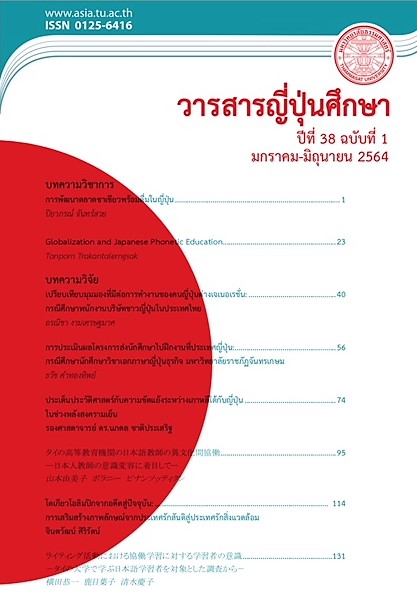Cross-Cultural Collaboration among Japanese Language Teachers in Thailand
Focusing on the Native Teachers’ Change of Views
Keywords:
collaboration, intercultural, Japanese teachers, Thai, change of viewsAbstract
This article presents the results of a study on Japanese native teachers’ change of views toward intercultural collaboration during their time of working at a university in Thailand. Three Japanese native teachers were interviewed. The narrative analysis was used to extract each participants’ collaborating experiences, collaborative problems, problem handling methods and concept of ideal collaboration through their autoethnography. The results clarified the following aspects.
1) Native teachers need to go through the process of cross-cultural understanding by letting conflicts arise and overcoming them with a long ongoing involvement.
2) To have a successful collaboration, a local partner who is easy to talk to and treat native teachers equitably is desirable.
3) To achieve the most ideal form of cross-cultural collaboration, not only the cooperation of the partner but also a healthy work environment that promotes collaborative culture is an important component.
Downloads
References
池田玲子・舘岡洋子(2007)『ピア・ラーニング入門ー創造的な学びのデザインのために』ひつじ書房
香月裕介(2011)「タイ人教師と日本人教師の役割分担から生まれる「つながる」動き―タイ国R大学日本語学科を例に―」『国際交流基金バンコク日本文化センター 日本語教育紀要』 8 , 45-54.
香月裕介、松尾憲暁(2017)「タイ人日本語教師と日本人日本語教師との協働に関わる三つの要因―日本人日本語教師の不快な経験の分析から―」『神戸学院大学グローバル・コミュニケーション学会紀要』2, 31-43.
カノックワン ラオハブラナキット 片桐・池谷清美・片桐準二(2016)「タイ人教師のコミュニケーションの仕方に出会った日本人教師の工夫とその過程―タイの大学の日本人教師のインタビューデータから―」『Japanese Studies Journal』33, 17-31.
佐久間勝彦(1999)「海外で教える日本人日本語教師をめぐる現状と課題―タイでの聞き取り調査を中心に―」『「世界の日本語教育」日本語教育事情報告編』 5, 79-107.国際交流基金日本語国際センター
サランヤー コンジット・吉田直子(2012)「ティーム・ティーチングにおけるネイティブ教師とノンネイティブ教師の役割分担 : チェンマイ大学初級日本語クラスのタイ人学習者の期待」『国際交流基金バンコク日本文化センター日本語教育紀要』9, 129-137.
嶋津百代(2018)「日本語教育・教師教育において「語ること」の意味と意義対話にナラティブの可能性を求めて」『言語文化教育研究』16, 55-62.
舘岡洋子(2005)『ひとりで読むことからピア・リーディングへー日本語学習者の読解過程と対話的協働学習』東海大学出版会
平畑奈美(2014)『「ネイティブ」とよばれる日本語教師―海外で教える母語話者日本語教師の資質を問う』春風社
――――(2019)『移動する女性たち―海外の日本語教育と国際ボランティアの周辺』春風社
古別府ひづる(2008)「タイ中等教育機関におけるタイ人日本語教師の良い日本語教師観―PAC 分析と半構造化面接より―」『国際交流基金バンコク日本文化センター日本語教育紀要』5, 37-46.
――――(2013)「タイ高等教育機関におけるタイ人日本語教師の良き日本語教師観―PAC分析と半構造化面接より―」『大学日本語教員養成課程研究協議会論集』8, 25-31.
中山栄治(2016)「タイにおける日本語教師間の協働モデルの再構築―日本語母語話者教師へのインタビュー調査に基づいて―」『大阪産業大学論集人文・社会科学編』28, 75-91.
中山英治・門脇薫・髙橋雅子(2017)「理想的な教師間協働を経験している教師の語り―SCAT による構成概念と理論仮説―」『日本語教育実践研究』5, 64-74.
矢崎千華(2016)「ナラティヴ分析を再考するー構造への注目ー」『関西学院大学社会学部紀要』125, 47-57.
吉田一彦・芝崎理恵(2009)「母語話者教師と現地教師との協働モデル構築に向けて
―モンゴルでできること、タイとの比較―」 『アジアの日本語教育:「外国語としての日本語」修士課程一周年セミナー論文集』89-102.
Labov, William. (1972). Language in the inner City. Philadelphia: University of Pennsylvania Press.
Ochs, Elinor & Capps,Lisa. (2001). Living narrative: Creating lives in everyday storytelling. Cambridge, MA: Harvard University Press.
Suneerat Neancharoensuk, Noppawan Boonsom, Soysuda Na Ranong.(2015). The problems of Japanese teachers when communicating with Thai teachers: An analysis of the problems caused by cultural differences. Japanese Studies Journal, 32(2), 137-147. (In Thai)




